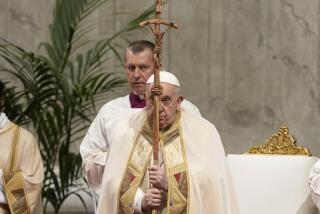Gestures Fulfilled, Gestures Wanting
JERUSALEM — When Pope John Paul II makes his pilgrimage to Yad Vashem, the Israeli Holocaust memorial, he will cap a 22-year pilgrimage of reconciliation to the Jewish people, inspired by his intimate relations with Jewish friends and neighbors in pre-World War II Poland and their subsequent disappearance in the war.
Many Jews will be listening carefully to the nuances of his remarks at Yad Vashem, concerned as much with what he omits as with what he says. Will he finally apologize for the silence of Pius XII during the Holocaust? Will he concede the responsibility of the church itself, rather than its sinning children, in promulgating teachings of contempt for Jews, which helped prepare Europe for the Holocaust?
Almost certainly, this radically humane but theologically conservative pope won’t do at Yad Vashem what he’s refused to do until now: violate dogma by denying papal infallibility and the perfection of the church. However hurt Jews may be by what they perceive as an incomplete apology for Christian anti-Semitism, the pope has gone as far as he possibly can in reaching out and seeking forgiveness.
Yet Jews and Catholics can maintain opposing historical memories even as they work toward greater interfaith understanding. The best proof is John Paul himself. No individual in the last 2,000 years has done more to encourage reconciliation between Christians and Jews than this pope. He is the first to establish diplomatic relations with the Jewish state and affirm the right of the Jews to return to Zion, negating the Christian notion of the “wandering Jew” cursed by God. He is the first to proclaim the ongoing validity of God’s covenant with the Jewish people, repudiating the doctrine that the “new Israel” has spiritually dispossessed the “old Israel.” He is the first to declare anti-Semitism a “sin against God and man”--in effect, a sin against the church itself.
Yet that remarkable record hasn’t penetrated Jewish consciousness, at least partly because we’ve been focusing on the one Jewish grievance that the pope cannot satisfy. When the Jewish-Christian dialogue first began in earnest in the 1960s, Jewish leaders made two demands on the Vatican: Change your negative theology toward the Jews and recognize the state of Israel. Both demands have since been fulfilled. Ironically, the Vatican’s very responsiveness to contemporary Jewish concerns enables us to now quarrel over the Holocaust.
After 40 years of sustained self-examination, the church is legitimately asking Jewish leaders for some measure of reciprocity. I would suggest two gestures. The first is for Jewish leaders to begin educating their communities about the extent of change in attitudes toward Jews both in church theology and education. Israeli school textbooks completely ignore those changes; the situation is scarcely better in American Jewish schools. Jews are accustomed to hearing from their leaders about how far the Vatican still has to go to meet Jewish sensibilities; we need to begin hearing how far the Vatican has come.
The second gesture is for Jews to graciously accept the pope’s apologies, agree to differ with him over the past and quietly remove the Holocaust from the center of Catholic-Jewish relations. The extent of Christian responsibility for the Holocaust is an issue that should be debated within the church; in fact, that debate has already begun. The recent devastating book, “Hitler’s Pope,” attacking Pius XII’s role in the Holocaust, wasn’t written by a Jew but a Catholic. By showing a measure of trust in the church as a religious institution with a conscience, we will encourage Catholics to examine their own past, rather than defensively respond to attacks from without.
By embodying the new theology and embedding it in the church, John Paul may well have laid the groundwork for other, less-conservative Catholics to begin questioning dogmas that he himself could not. But however the church ultimately decides to view its history, John Paul has already ensured that the major problems dividing Jews and Catholics belong firmly to that past. And that is an achievement worth celebrating.
More to Read
Sign up for Essential California
The most important California stories and recommendations in your inbox every morning.
You may occasionally receive promotional content from the Los Angeles Times.










